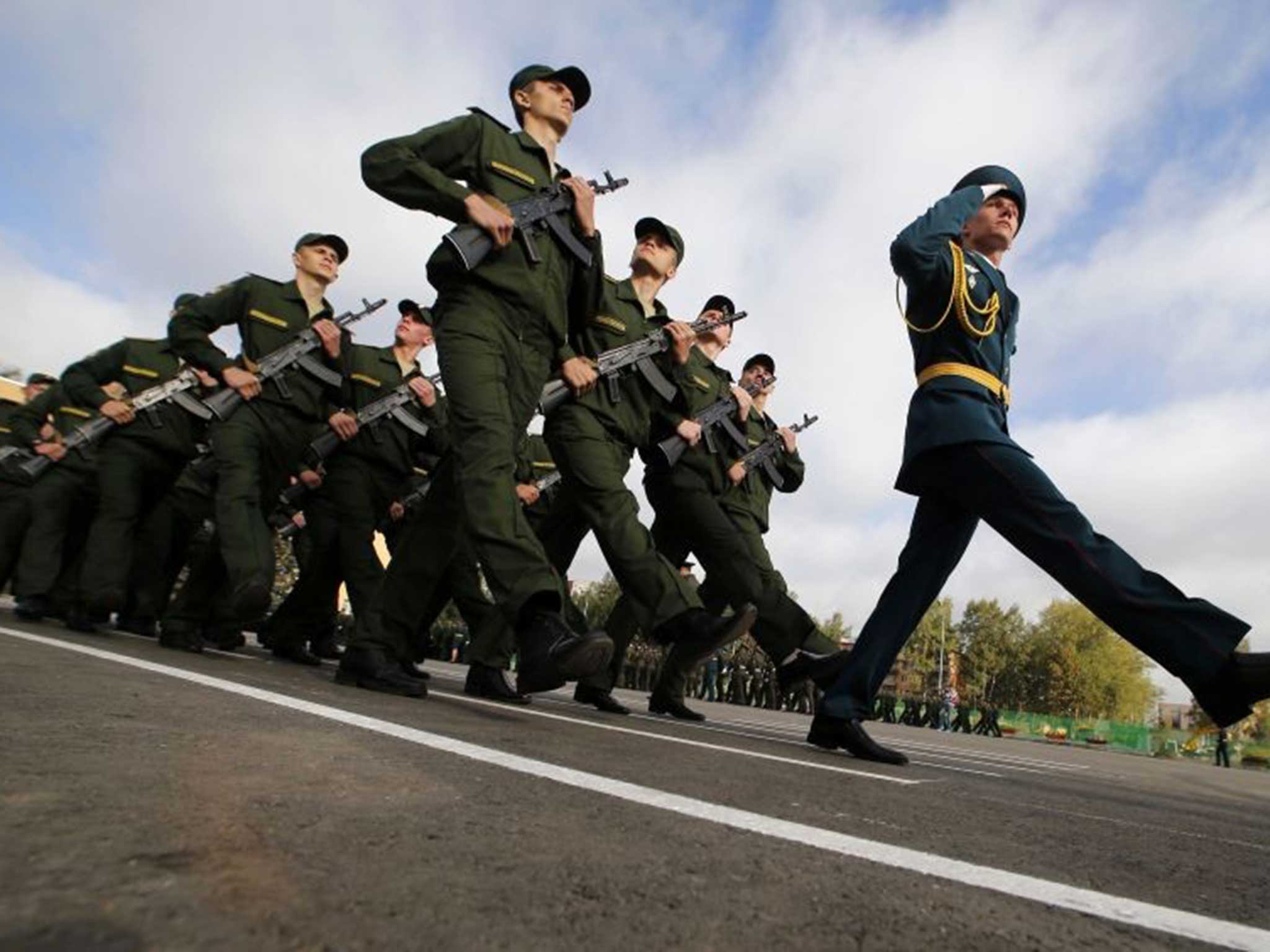Ukraine crisis: Nato shores up defences against a Putin steeped in 'Soviet nostalgia'
With Russia set to approve a military spend of £60bn by 2016, alliance reverses the trend of its own declining defence budgets

The war games were unprecedented, taking place close to Ukraine's border and involving thousands of troops, tanks and fighter jets. Russia had flexed its military muscles and triggered outrage across the world.
The crisis in east Europe began with civil unrest leading to the ousting in February of the then Ukrainian President, Viktor Yanukovych – before escalating with the Russian annexation of Crimea, in March, and the beginning of an "anti-terror" campaign by Ukrainian forces against pro-Russian separatists in April. As clashes continued to build with the passing months, accusations of Russian troop involvement in east Ukraine's bloody conflict became increasingly vehement.
Then, as pro-Russian rebels won a series of victories against government forces in Donetsk and Luhansk, what had begun as suspicions of Russian military involvement – the "green men" referred to in Crimea – became outright accusations of up to 10,000 soldiers sent across the border.
This week, as world leaders met in Wales with the Ukraine crisis high on the agenda, it emerged that Russian defence spending had been rising at an unprecedented rate. Moscow's defence budget is due to be double that of France within two years, and has risen by 18 per cent each year in the past three years.
But the spending is not described as a "knee-jerk reaction" to the Ukraine crisis. "This is a long-term government policy and a political priority for Moscow," said Craig Caffrey, the senior defence budgets analyst at IHS Jane's.
Observers say that to understand the increased military spending, and resulting aggression on the world stage, the key is to understand the final two decades of the Soviet Union, when Vladimir Putin "watched the Soviet descent to oblivion begin, accelerate, and then end in a humiliating wreck", The Washington Post reported.
Ukraine crisis: A timeline of the conflict
Show all 23In 1975, when Mr Putin was a university graduate about to start work as a KGB spy, the Soviets were in a position of strength, with a new generation of military hardware, wrote Professor Tom Nichols, of the US Naval War College, on The Federalist website last week. "The Soviets were at the top of their game," he said, and Mr Putin was someone "saturated with Soviet nostalgia". In that context, the spending on defence and build-up of troops has worried the West.
At the Nato summit it was agreed to add a 4,000-troop rapid-response force to an existing 13,000-strong force. Poland had requested that 10,000 Nato troops be stationed with heavy artillery in the country to counter Russian aggression. Polish Prime Minister Donald Tusk said he had hoped for more, but that: "This signal is very strong and our Eastern neighbour [Russia] cannot ignore it."
Referring to the alliance's commitment to the element of the Washington Treaty, whereby an attack on one nation constitutes an attack on all 28, Barack Obama visited Estonia before flying to Wales in a bid to reassure Eastern states that should Russia invade, Nato would respond.
"I say to the people of Estonia and the people of the Baltics, today we are bound by our treaty alliance," said Mr Obama. But only four Nato members (the US, Britain, Estonia, Greece) fulfil their obligation to spend at least 2 per cent of GDP on defence.
Nato Secretary General Anders Fogh Rasmussen said members had agreed to reverse the trend of falling defence budgets and "aim to move towards the existing Nato guideline".
According to IHS Jane's, Russia's defence budget was £35bn in 2011 and that had risen to £48bn this year – almost 5 per cent of GDP. The Kremlin is expected to approve spending of £60bn by 2016 – greater than Germany and France combined. This year was the first time Russia devoted a larger share of its GDP to military spending than the US since 2003.
"It is looking like, as a result of Russia's actions in Ukraine, that military spending is likely to start increasing in those countries that are nearest to Russia, the front line and the Nordic countries," Samuel Perlo-Freeman, head of the military expenditure project at the Stockholm International Peace Research Institute told The New York Times.
However, in a direct response to Russian involvement in Ukraine, on Wednesday, France's President François Hollande put on hold the delivery of a Mistral helicopter carrier – the Vladivostok – to Russia. The carrier, set to be delivered in weeks, was one of two in an agreement between the nations. The sale was due to be the biggest by a Nato member to Moscow, with Mr Hollande suggesting later that he would reassess the deal near the end of October.
Without an obvious military solution to the Ukraine crisis, the EU and US has launched a wave of economic sanctions against Russia.
On Friday night, even as the ceasefire agreed between Ukrainian President Petro Poroshenko and Mr Putin was observed, the EU issued further sanctions. These include making it harder for Russian state-owned firms to raise finance in Europe, and adding 24 people to a list of those barred from entry to the bloc, and whose assets in the EU are frozen.
"The implementation is expected on Monday," one senior EU diplomat told Reuters. "A ceasefire must hold for sanctions to be lifted."
Yesterday, Russia reacted to the threat. "If they [the new sanctions] are implemented of course there will be a reaction from our side," the Foreign Ministry said in a statement.
Subscribe to Independent Premium to bookmark this article
Want to bookmark your favourite articles and stories to read or reference later? Start your Independent Premium subscription today.

Join our commenting forum
Join thought-provoking conversations, follow other Independent readers and see their replies